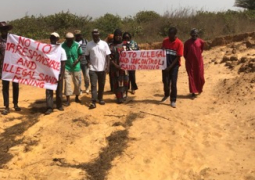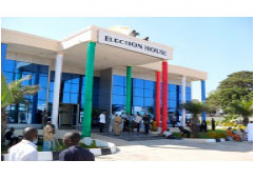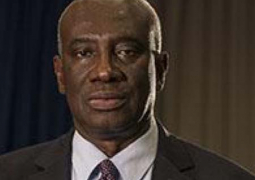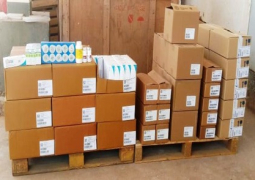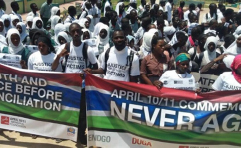
"The moment I heard the news on the BBC radio, I had a couple of questions running through my head. I wondered what could have prompted the violence which led to the killings of the students,” Mr Bojang narrated.
He said he immediately called his house back home in Jambur as he thought about his 18-year-old son who was also in high school at the time.
"I called to enquire about my son's whereabouts and was told that he left for school and wasn't yet home,” he says.
But when he got home, he said a lot of people were gathered at his compound but none of them wanted to tell him what was going on.
After what seemed like forever, he was told that his son alongside some dead and injured students was admitted at the Royal Victoria Teaching Hospital (RVTH) now Edward Francis Small Teaching Hospital (EFSTH).
"I parked my car and jumped on the motorbike and headed straight for the RVTH,” he explains. “When I got there, I got the news that my son was in one of the rooms and that I wouldn't be able to see him. I became disorderly and demanded to see my son but was not allowed."
The following day he went back to the hospital only to be told this time around that his son had died.
April 10th and 11th Students Massacre
In the year 2000, at least 14 students and one Red Cross volunteer were gunned down and killed by security officials following a nationwide student protest.
The students took to the streets to demand justice for two of their colleagues, Ebrima Barry, who was allegedly killed after being punished by a teacher, and Binta Manneh, who was allegedly raped by policemen.
Following fruitless negotiations by the Gambia Students’ Union (GAMSU) with the Gambian government, the students lost patience and took to the streets to protest, what followed was deadly and brutal.
Bojang said this was a challenging period in their lives, most especially his wife, Lamin's mother, who was four months pregnant at the time and because of shock, had to be admitted for premature labour.
"My wife was prescribed high blood pressure which caused her into premature labour,” Bojang says.
"It is too much on us and the trauma has had a huge toll on my wife's mental health so much so that she's always off social gatherings. She always keeps to herself when people are around."
Bojang is a father of sixteen. He was already a father of eleven before Lamin died and Lamin was his only son at the time.
Lamin, he said, was in his eleventh grade at Nusrat Senior Secondary school
"He was a smart lad, always had great results, well-known and always hardworking,” he recounts.
Unhealed and Heartbroken (Jammeh's Witch-hunt Exercise)
In 2009, former president Yahya Jammeh lashed out with a witch-hunt exercise following the death of his aunt whom he believed was killed by witches and witchcraft. He set out the witch-hunt exercise with the help of his 'junglers' who went into targeted compounds and forcefully arrested some people.
The victims were taken to different locations where they were given herbal concoctions to 'force them to accept the claims of being witches and engaging in witchcraft.
Mr Bojang's mother, who's now 98-year-old, was among the victims accused of witchcraft in Jammeh's 2009 witch-hunt exercise.
"They forcefully dragged my mum and took her to an unknown location,” he said. "I was not home then; I was away at work in Serrekunda when this happened.
"The alkalo called me to tell me the news of my mum's captivity. I left everything I was doing to look for my mum but I couldn't trace her location."
He said the following day, his mum and the other victims were released and asked to go back home.
"Their return home wasn't at all pleasing. These victims, including my mum, were mocked, laughed at, and called all kinds of names,” he says, adding that if his mum had spent a day more in custody she would have died.
"This happened during the cold weather and these victims were asked to lie on the cold floor. The victims were named and shamed. Up till today, some of them have refused to leave their houses and have refused to socialize with other residents as a result of the shame and embarrassment Yahya Jammeh's men put them through
In 2017, he started working with the victims center to help in the Transitional Justice process and has since been working with the Association for Victims Reparations (WAVE).
And today, sitting at the WAVE witch-hunt screening held in his home of Jambur for the South Sudanese delegation, Bojang prays their efforts do not go in vain.
The Gambia's Transitional Justice Process
Following the electoral defeat and exile of former dictator Yahya Jammeh in 2017, The Gambia embarked on a Transitional Justice process to rebuild a democratic state where human rights, individual freedoms, and rule of law prevail.
The former government, under the leadership of dictator Yahya Jammeh, who is currently in exile in Equatorial Guinea, witnessed a lot of heinous human rights violations including sexual assault, enforced disappearance, murder, arbitrary detention, and torture.
The current government of The Gambia has since embarked on a transitional justice process including but not limited to security sector reforms, the Constitutional Review Commission (CRC), which didn't push through, and the Truth Reconciliation and Reparations Commission (TRRC).
Following the implementation and final recommendations by the TRRC, the government is currently underway in implementing the recommendations of the TRRC.
"The Government is currently in the process of preparing its implementation plan which will be launched during the first quarter of this year (2023) during an international stakeholder/donor conference," says Kimbeng Tah.
He says the government has finalized consultations and has drafted the Victims Reparation Bill to create an independent body to administer reparations for victims.
“[Moreover], the Government is similarly in the process of setting up an interim medical board to review and provide emergency medical care for victims of human rights violations including particularly the victims of April 10 and 11," says Mr Tah.
On accountability, he says, the government has finalised a prosecution strategy that will guide prosecutions and is currently working with ECOWAS towards setting up an internationalised court for prosecutions.
"Finally, while awaiting the launching of the Implementation Plan to guide the overall implementation, the Ministry of Justice is actively implementing the White Paper, especially recommendations that do not require significant financial resources to implement," Mr Tah highlighted.


